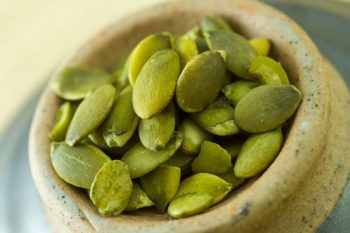By Sayer Ji
Contributing writer for Wake Up World
Pumpkin seeds, like all edible seeds, pack an immense nutritional and medicinal punch. After all, they contain future worlds within their compact structure. As Emerson said, “the creation of a thousand forests is within one acorn.”
In order to prepare their “babies” for survival outside the pumpkin, nature equips these seeds with an extremely dense source of organically-bound nutrients, including exceptionally high levels of key, health-promoting minerals.
For example, a one cup serving (64 grams) of pumpkin seeds has 44% daily value (DV) of zinc, 22% of copper, 42% magnesium, 16% manganese, 17% potassium, and enough iron (17% DV) to improve iron-deficiency associated anemia. And remember, food-derived minerals are far more bioavailable and biocompatible than inorganic forms, as we recently discussed in the article: Is Your MultiVitamin Trying to Kill You?
[pro_ad_display_adzone id=”110028″]
But beyond the obvious nutritional virtues of the seed, recent scientific investigations have revealed that pumpkin seed meal, as well as its pressed oil, may have great therapeutic value in alleviating the following conditions:
Prostate Growth:
pumpkin seed has been studied for its ability to inhibit testosterone-induced prostate growth, a common causative factor in benign prostatic hyperplasia.[i] [ii] It was also proven safe and effective in a 2014 clinical trial comparing it to the drug Prozasin. More details here.
Postmenopausal Symptoms:
Women supplemented with 2,000 mg of pumpkin seed oil over the course of 12 weeks were found to have reduced blood pressure, increased HDL cholesterol, as well as reduction in the severity of hormone insufficiency associated symptoms, e.g. hot flash, headaches and join pain.[iii] Additional experimental research indicates that adverse cardiovascular changes associated with estrogen deficiency, such as blood pressure and lipid abnormalities, can be mitigated with pumpkin seed oil. [iv]
Calcium-Oxalate Kidney Stones:
According to a study performed in 1987 and published in the American Journal of Clinical Nutrition, children with calcium-oxalate crystals in their urine responded favorably to the supplementation of their diet with pumpkin seeds.[v]
Cardiovascular and Liver Disease:
A mixture of flaxseed and pumpkin seed was found to have heart-protective and liver-protective properties in an animal study from 2008 published in the Journal of Food Chemistry & Toxicology.[vi]
Drug & Chemical Toxicity:
The protein isolate of pumpkin seed has been shown to alleviate acetaminophen (Tylenol) toxicity on the liver,[vii] and as methotrexate-induced small intestine damage in an animal model.[viii] It has also been studied to protect against carbon tetrachloride-induced liver injury.[ix]
Arthritis:
Pumpkin seed oil was found to compare favorably with the NSAID drug indomethacin in an experimental model of arthritis, but without causing liver damage, in a study published in 1995 in the journal of Pharmacological Research.[x]
Hypertension:
Animals fed pumpkin seed oil were found to respond more favorably to conventional drug-treatment with Ace-inhibitors and Calcium Channel Blockers, likely because of its beneficial antioxidant properties.[xi]
Parasites:
A preclinical canine study has shown that pumpkin seeds have significant activity against intestinal parasites.[xii]
Insomnia/Anxiety:
Pumpkin seeds contain a high level of tryptophan (22mg/gram of pumpkin seed protein), the amino acid precursor to serotonin – which is itself converted to melatonin, the “sleep hormone,” in the evening. Research published in 2007 in the Canadian Journal of Physiology and Pharmacology found that when de-oiled pumpkin seed was taken in combination with glucose, a clinical effect similar to that of pharmaceutical-grade tryptophan was achieved.[xiii] A 2005 study published in the journal Nutritional Neuroscience found that pumpkin seed sourced tryptophan in combination with carbohydrate was as effective as pharmaceutical tryptophan in reducing awake time during the night.
Androgenic Alopecia (i.e. male pattern baldness):
A 2014 randomized, double-blind, placebo-controlled trial published in Evid Based Complement Alternat Med found that men receiving pumpkin seed oil saw 30-40% increased hair counts while the placebo group showed only 5-10% more hair count on average. Learn more in GreenMedInfo’s report on the study here. Pumpkin Seed Oil Found to Help Reverse Balding.
Overactive Bladder/Urinary Disorders:
A 2014 clinical trial found that pumpkin seed oil, at 10 grams a day for 12 weeks, was safe and effective in reducing Overactive Bladder Symptom Score (OABSS) in patients with Overactive Bladder. More details here.
These, of course, are only some of the experimentally confirmed beneficial properties of pumpkin seed. Like all foods, there are likely countless properties which within the right context, the right timing, and the right amount, fulfill Hippocrates’ age-old and timelessly true proclamation that food can be our medicine. Stay abreast of new research on pumpkin seed oil and other pumpkin components on GreenMedInfo’s database dedicated to the topic: Pumpkin Research.
Recommended articles by Sayer Ji:
- Brain Regeneration: Why It’s Real and How To Do It
- Research: Garlic is an Effective Natural Treatment for Heart Disease
- Wi-Fi Devices Increase Mercury Release From Dental Amalgams
- Mammography Is Harmful and Should Be Abandoned, Scientific Review Concludes
- “Killer Germs” Obliterated by Medicinal Smoke Smudging, Study Reveals
- Turmeric’s ‘Smart Kill’ Properties Put Chemo & Radiation To Shame
- Beet Juice Boosts Cognitive Function In One Dose
- The Powerful Aspirin Alternative Your Doctor Never Told You About
- 13 Evidence-Based Medicinal Properties of Coconut Oil
- Group Drumming Better Than Prozac, Study Suggests
- 25 Cancer Stem-Cell Killing Foods That Are Smarter Than Chemo and Radiation
- Ibuprofen Can Stop Your Heart – 31% Increase in Cardiac Arrest Risk
- How Pomegranate Puts Chemo and Radiation to Shame
About the author:

Sayer Ji is the founder of Greenmedinfo.com, a reviewer at the International Journal of Human Nutrition and Functional Medicine, Co-founder and CEO of Systome Biomed, Vice Chairman of the Board of the National Health Federation, and Steering Committee Member of the Global Non-GMO Foundation.
For more, visit GreenMedInfo.com and Facebook.com/GreenMedInfo, or sign up for GreenMedInfo’s free e-Newsletter.
© October 8th, 2017 GreenMedInfo LLC. This work is reproduced and distributed with the permission of GreenMedInfo LLC. Want to learn more from GreenMedInfo? Sign up for their newsletter here.
[pro_ad_display_adzone id=”110027″]







